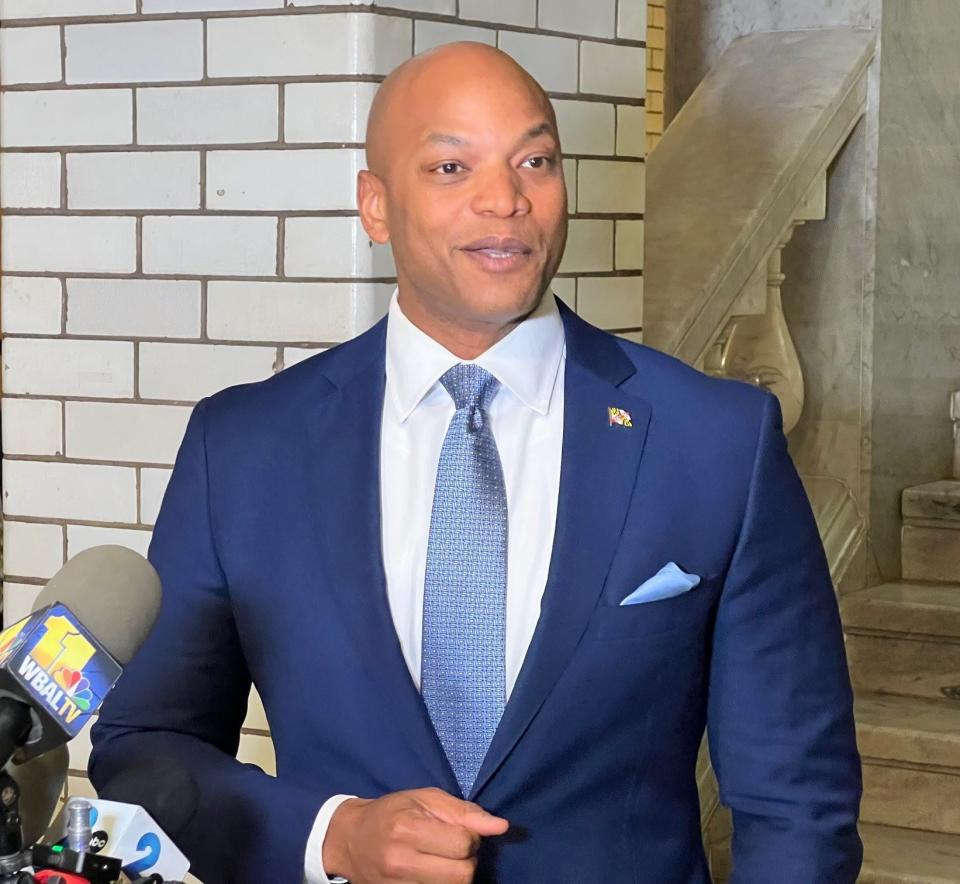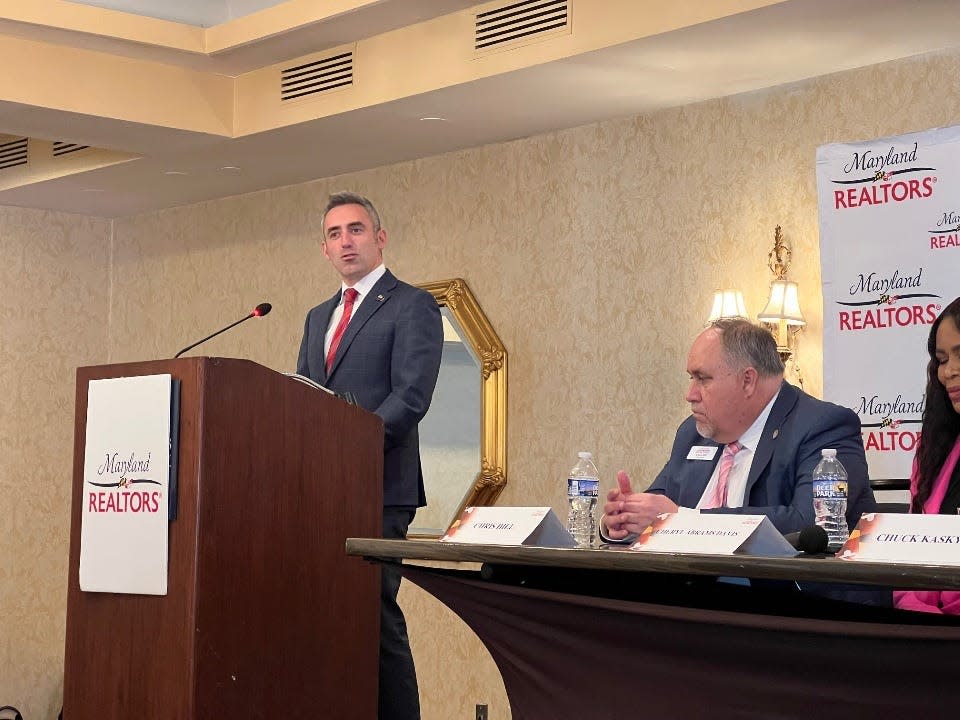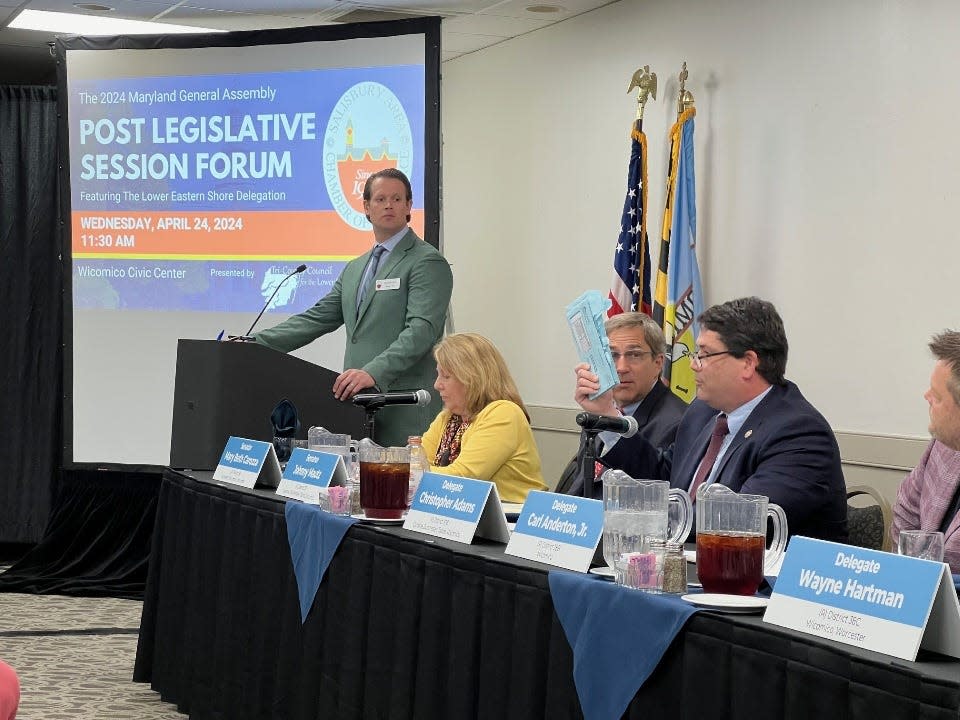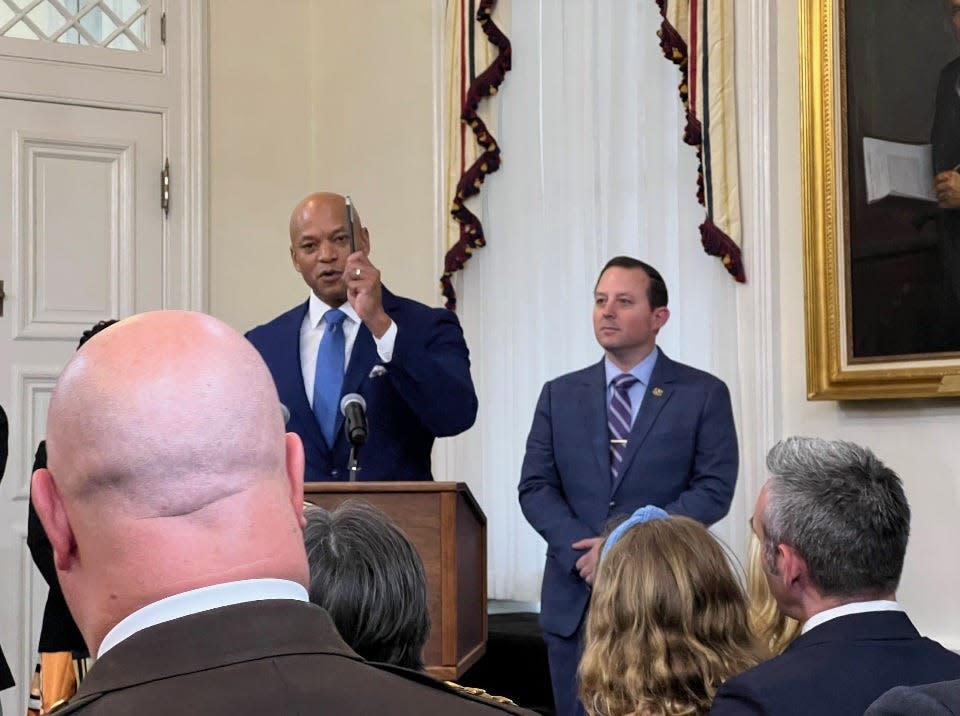'We knew it was an issue that could not wait': Moore signs multiple housing bills into law
Maryland Gov. Wes Moore signed the Renters’ Rights and Stabilization Act and other housing legislation into law during a bill signing ceremony at the State House in Annapolis on Thursday.
Del. Chris Adams, R-Wicomico/Caroline/Dorchester/Talbot, a landlord, was not there, and thus did not participate in the smiling and celebratory atmosphere. Neither were, so far as public pronouncements indicated, any of the more than 400 individuals who were evicted in Wicomico County last year.
“We knew it was an issue that could not wait,” said Moore, a Democrat, from the lectern in the Governor’s Reception Room, prior to signing three housing-related bills into law, which the administration backed during the General Assembly’s 90-day session that concluded April 8.

Of the Renters’ Rights legislation, Moore said: “This is going to help protect our renters from eviction.”
A pair of Wicomico County natives, representing different political parties and who will be affected by the bill’s enactment, agreed, but the two had quite different takes on the legislation.
REVIEW: Maryland Housing Secretary Day estimates 96,000-unit housing shortage. Bills aim to help.
Maryland had 21,000 evictions last year. New law aims for reduction.
At a news conference earlier this month, on the last day of the legislative session, Moore said that the housing bills would make a “real impact on the lives of everyday Marylanders.”
The Housing Expansion and Affordability Act that he signed on Thursday provides a density bonus for developers, limits duplication of public hearings and reduces restrictions on manufactured homes when the law goes into effect on Jan. 1 of next year. The Housing and Community Development Financing Act, also signed Thursday, creates the Maryland Community Investment Corporation as a federally certified Community Development Entity in an effort to pull in federal dollars and investments. That bill goes into effect on July 1, 2024.
The new renter’s legislation, the third bill in the package, is a law that “changes the landscape for renters in the state of Maryland,” according to Secretary of the Maryland Department Housing and Community Development Jake Day, a Salisbury native and the leader of the agency tasked with implementing the legislation as some parts go into effect in October later this year.

“Maryland will move from being the state with both the highest eviction filing rate and the lowest eviction filing fee to a state with a still below average, but much higher — from $15 to $50 — filing fee, and that in itself will be significant,” said Day, in an April 23 phone interview.
More than 400,000 “failure to pay rent” cases were filed in Maryland last year. Jacob Haas, a senior research specialist at The Eviction Lab at Princeton University, providing the figures for Virginia and Pennsylvania during an interview last year, indicated that the annual filing totals for those two states combined were still less than they were in Maryland.
REVIEW: Evictions, rising after rent assistance ran out, back near pre-pandemic levels in Maryland
There were 21,000 evictions in Maryland, according to district court documents, last year. Over 600 evictions occurred in Washington County and 409 took place in Wicomico County, where Salisbury is the county seat.
Day, the former mayor of Salisbury, who started in his new role at the start of last year, asked the question critical to 21,000 Marylanders during the interview two days before the bill was signed.
“Will (the new law) reduce eviction filings and thus evictions as well? I believe so, yes,” he said.
More: ‘The 2024 Legislative Session will never be eclipsed': Lawmakers wrap up for year
New law creates an office of tenant and landlord affairs
Evictions were drastically reduced the three years previous to 2023 due to a federal pandemic-related eviction moratorium and an emergency rental assistance program that ran out of funding in some places last year.
In 2019, the last year before the moratorium, Maryland registered 21,676 evictions in 12 months.
Asked how to address the housing situation in the Wicomico County given the county’s 400-plus evictions last year, Adams, also a Salisbury native, said: “I believe that the contract and the relationship between the landlord and the tenant needs to be honored with respect.”

Get to know Del. Adams: Del. Chris Adams inspired by Salisbury business career in leading Eastern Shore delegation
“There are many ways for the state to support people who are in trouble and the threat of being evicted, those are not through penalizing the producers of rental properties,” said Adams, during an interview after a post legislative session forum in Salisbury on April 24. “The responsibility falls to government primarily through subsidies to people who truly need it.”
(The chief operating officer of a Salisbury-based organization with about 100 rental units expressed her view and said during an interview in 2022 that the emergency rental assistance program was “taken advantage of” by some tenants.)
Asked if the new legislation would reduce evictions in Wicomico County, Adams said: “At the expense of the landlord, yes.”
Under the Renters’ Rights and Stabilization Act, about half of the eviction fees go towards a statewide rental assistance voucher program, while about half go towards funding legal services.
The law requires a tenants’ “Bill of Rights” to be an addendum to all leases signed in the state, creates an office of tenant and landlord affairs in the Housing and Community Development department, and limits the security deposit a landlord can collect to one month’s rent.
The law also provides renters the “right of first refusal,” giving renters an opportunity to match a sale price and purchase a property that they occupy when it is being sold.
“Prior to the passage of this bill, we have had very limited powers and resources to protect the most vulnerable people in the state,” said Day, adding that the new law changes “that dynamic.”
Two days before the three housing bills backed by the governor were signed into law along with another bill, the “Just Communities Designation,” HB241, backed by the department, Day addressed the work ahead to improve housing in a state with a shortage of at least 96,000 units.
“I don’t think we should be claiming victory at any stage because it is going to take a tremendous and multi-year effort,” he said.
More: Housing in Maryland at ‘inflection point,’ Sec. Day says. Legislature considers bills.
Gov. Wes Moore gives first signing pen for housing laws to a sheriff
Speaking from the lectern prior to autographing the housing bills, Moore presented not a tenant or a landlord with the first official signing pen, but someone who he said is “seeing both sides.”
He had just finished emphasizing the Democratic and Republican support for the housing legislation when the Democratic governor said that “our officers are seeing both sides.”
(Of the three bills, the Renters’ Rights and Stabilization Act was the only bill that did not start with a Republican Senate co-sponsor. After amendments, it ended with a vote of support by the Senate Minority Leader, state Sen. Steve Hershey, R-Caroline/Cecil/Kent/Queen Anne's Counties, among a few other Republicans.)
The both sides that Moore described was not a reference to partisan politics, but a nod to the law enforcement officers as “often the ones who seek more affordable places to live” and as those “serving eviction for tenants.”

With the state’s housing secretary, who is charged with implementing the new laws in the coming months, sitting in front of him, Moore presented the first signing pen to Baltimore City Sheriff Sam Cogen, who, according to Moore, helped work on the language of the renters’ law.
“All the time that you were spending focusing on evictions,” said Moore, before embracing Cogen and giving the pen, “Let’s get that off your plate, and now let you get back to the work.”
Dwight A. Weingarten is an investigative reporter, covering the Maryland State House and state issues. He can be reached at dweingarten@gannett.com or on Twitter at @DwightWeingart2.
This article originally appeared on Salisbury Daily Times: Gov. Moore signs Renters’ Rights, other housing bills into law

